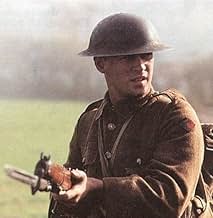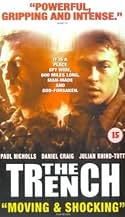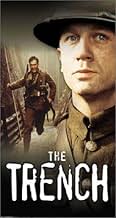IMDb-BEWERTUNG
5,9/10
4593
IHRE BEWERTUNG
Die Geschichte zeigt die Zustände in den Schützengräben und wirft einen Blick in die Gedanken einer Gruppe von Soldaten in den letzten Tagen vor der Schlacht an der Somme 1916 während des Er... Alles lesenDie Geschichte zeigt die Zustände in den Schützengräben und wirft einen Blick in die Gedanken einer Gruppe von Soldaten in den letzten Tagen vor der Schlacht an der Somme 1916 während des Ersten Weltkriegs.Die Geschichte zeigt die Zustände in den Schützengräben und wirft einen Blick in die Gedanken einer Gruppe von Soldaten in den letzten Tagen vor der Schlacht an der Somme 1916 während des Ersten Weltkriegs.
- Auszeichnungen
- 2 Gewinne & 2 Nominierungen insgesamt
Antony Strachan
- Pte. Horace Beckwith
- (as Anthony Strachan)
Empfohlene Bewertungen
The focus of "The Trench" obviously is on the human aspects of the British men who have gone to war in World War I. It does a good job of portraying the British soldiers with their emotions, thoughts and trepidations about their circumstances in the trenches of northern France. But it also seems to distort some of the human trappings and demeanors of the time. When movies impose modern mores and culture on the past, they distort that time and its culture and history. Thus, people who don't study such things or have knowledge of the times wind up with an inaccurate notion of history or of the reality of that time.
Two things seem obvious as cultural distortions in this film. The first is the casual, almost disrespectful attitude and unruliness of the soldiers. This isn't something that happens just once or twice, but frequently. While all military throughout history likely has had some humor and playful banter among troops at times, it seems to be more of the rule among this platoon of Brits. The second is in the language. Again, all military throughout history likely has had some use of foul or rough language. But here, it seems that this 1916 platoon of British soldiers has adopted early 21st century British street talk (is it really that vulgar among society in England today?). And, I doubt that the British may always have had more vulgar mouths than we Yanks. But, by the standard of this film, the Brits make the service times of my family, from WW II through Vietnam, seem like baby talk.
There may be any number of other distortions as well. Anthony Strachan, who plays Horace Beckwith, is very good in his role. But I doubt that a man so much over weight would have been conscripted or allowed to join the British Army then, or any time. I knew some men a little over weight at my boot camp, but they were whipped into shape by the end, usually with much less weight to carry around. The men in this film seemed almost constantly to be smoking cigarettes. Cigarette smoking grew immensely during WW I, but it wasn't yet to the point shown in this film among British soldiers. In a long documentary film of WWI that came with the DVD of this movie, I didn't see a single scene of men smoking cigarettes on the French, British and German lines. But, several scenes showed Allied soldiers in the trenches smoking pipes.
The last couple of gross inaccuracies are in the setting. The movie folks did a credible job building the set of trenches – except for one thing. Where is the water and mud? The Allied trenches of WWI were notorious for their foul water and mud, yet we don't see any of that here. And, the scene of the battlefield that the Brits have to charge onto is a lush green meadow. That was almost laughable. Both sides had been bombarding that area for days on end. The land was a desolate wasteland.
The distorted portrayal of the conditions and culture are significant enough to cost this film two stars, so I can rate it no higher than six stars. I base that mostly on the fine performances of the cast – all the actors. The setting of this film was in the days leading up to the first day of the British attack in the Battle of the Somme (July 1 to November 18, 1916). That first day – when this film ends – cost more than 60,000 British soldiers wounded or killed. It's considered the bloodiest slaughter in the history of the British Army.
I mentioned a bonus documentary that came on the DVD with this film. "World War I: On the Western Front" is an excellent lengthy documentary of WWI. It is a CBS News documentary that shows only actual battle film of the French, British and German forces. It is narrated by actor Robert Ryan. That documentary is centered around the Battle of Verdun which cost more than 500,000 lives. It shows scenes all along the Western Front. Men are standing in deep water in the trenches. Men and machines try to move over drenched and muddy roads and fields. And, battlefields between the lines are a no-man's wasteland. Not a blade of grass, flower or tree can be seen. None of that was staged by Hollywood, but Hollywood (in the U.S. and abroad) would do well to study such actual war films to better and more accurately portray scenes in war movies.
Two things seem obvious as cultural distortions in this film. The first is the casual, almost disrespectful attitude and unruliness of the soldiers. This isn't something that happens just once or twice, but frequently. While all military throughout history likely has had some humor and playful banter among troops at times, it seems to be more of the rule among this platoon of Brits. The second is in the language. Again, all military throughout history likely has had some use of foul or rough language. But here, it seems that this 1916 platoon of British soldiers has adopted early 21st century British street talk (is it really that vulgar among society in England today?). And, I doubt that the British may always have had more vulgar mouths than we Yanks. But, by the standard of this film, the Brits make the service times of my family, from WW II through Vietnam, seem like baby talk.
There may be any number of other distortions as well. Anthony Strachan, who plays Horace Beckwith, is very good in his role. But I doubt that a man so much over weight would have been conscripted or allowed to join the British Army then, or any time. I knew some men a little over weight at my boot camp, but they were whipped into shape by the end, usually with much less weight to carry around. The men in this film seemed almost constantly to be smoking cigarettes. Cigarette smoking grew immensely during WW I, but it wasn't yet to the point shown in this film among British soldiers. In a long documentary film of WWI that came with the DVD of this movie, I didn't see a single scene of men smoking cigarettes on the French, British and German lines. But, several scenes showed Allied soldiers in the trenches smoking pipes.
The last couple of gross inaccuracies are in the setting. The movie folks did a credible job building the set of trenches – except for one thing. Where is the water and mud? The Allied trenches of WWI were notorious for their foul water and mud, yet we don't see any of that here. And, the scene of the battlefield that the Brits have to charge onto is a lush green meadow. That was almost laughable. Both sides had been bombarding that area for days on end. The land was a desolate wasteland.
The distorted portrayal of the conditions and culture are significant enough to cost this film two stars, so I can rate it no higher than six stars. I base that mostly on the fine performances of the cast – all the actors. The setting of this film was in the days leading up to the first day of the British attack in the Battle of the Somme (July 1 to November 18, 1916). That first day – when this film ends – cost more than 60,000 British soldiers wounded or killed. It's considered the bloodiest slaughter in the history of the British Army.
I mentioned a bonus documentary that came on the DVD with this film. "World War I: On the Western Front" is an excellent lengthy documentary of WWI. It is a CBS News documentary that shows only actual battle film of the French, British and German forces. It is narrated by actor Robert Ryan. That documentary is centered around the Battle of Verdun which cost more than 500,000 lives. It shows scenes all along the Western Front. Men are standing in deep water in the trenches. Men and machines try to move over drenched and muddy roads and fields. And, battlefields between the lines are a no-man's wasteland. Not a blade of grass, flower or tree can be seen. None of that was staged by Hollywood, but Hollywood (in the U.S. and abroad) would do well to study such actual war films to better and more accurately portray scenes in war movies.
World War I has been very neglected by the movie industry, so that fact in itself makes this film slightly "unusual". While it's impossible to say how "accurate" this depiction of life in the trenches really is, to my eye the sets, the uniforms, the equipment etc. looked pretty impressive. However, I did have a problem with the gratuitous use of the "f" word, which all the characters seemed to use more and more as the film went on. I have nothing at all against "bad language" in a movie if it's in the right context, but swearing just for the sake of it just gets boring after a while - and more to the point, did young British men nearly 90 years ago REALLY say "f**k" all the time, as young men these days seem to? I would guess not. As a youngster I knew a number of old soldiers (elderly neighbours, great uncles and the like) who had actually fought in the First World War, and I don't recall ever hearing one of them use even mild profanities. So to my ear, much of the banter between the young soldiers in the movie seemed somewhat anachronistic. I also had a problem with the scene when the troops finally went "over the top" towards the end of the movie. Instead of marching across a devastated, shell-cratered moonscape which was typical of World War I battlefields, we had them marching across a very lush, green English field bearing not a single scar of war!!! This, and the complete absence of enemy troops in the movie (apart from the solitary prisoner brought back from a night raid) betrayed the film's low budget. A moderately interesting film that has you sympathising with the characters by the end, but I won't be going out of my way to give it a second viewing and I'm glad that I saw it on TV, rather than spending hard-earned money on the DVD. 5 out of 10.
Who would choose to make their debut a WWI character piece set within the confines of one trench? For his first directorial effort William Boyd has not tried to run before he can walk, and Paul Nicholls in his first released feature plays a role he clearly empathises with.
The relative inexperience of Boyd is evident in the modesty of the production - no expensive effects, no epic locations - but that actually works well in this study of young men trying to cope with the unthinkable horror that characterised the World War One battlefield.
Cooped up for days in dreadful conditions, the various characters - the naive (Nicholls), the intellectual (D'Arcy), the objectionable (Dyer), the loveable fattie (Strachan) - at turns argue with and provide support for each other, but at the end of the day have to face almost certain death on their own and in their own way.
This is not a great film, it doesn't quite provide a strong enough focus to help you empathise with the characters, for the most part it feels like a filmed play, but as a film it is able to provide moments of real visual power such as the final scenes as the boys finally leave the trenches to face the German guns.
For those last few minutes, the realisation of what they are about to do hits you hard, you can really sense the terror that they must have felt.
Despite it's "theatrical" feel at times, and the constraints of its setting, this is a fine and evocative film, with an excellent cast. Paul Nicholls, Danny Dyer and James D'Arcy are not alone in giving faultless performances, but the star of the film must be Daniel Craig, who is superb as Sgt Winter, a man who has survived the battlefield once, but knows his luck is about to run out.
The relative inexperience of Boyd is evident in the modesty of the production - no expensive effects, no epic locations - but that actually works well in this study of young men trying to cope with the unthinkable horror that characterised the World War One battlefield.
Cooped up for days in dreadful conditions, the various characters - the naive (Nicholls), the intellectual (D'Arcy), the objectionable (Dyer), the loveable fattie (Strachan) - at turns argue with and provide support for each other, but at the end of the day have to face almost certain death on their own and in their own way.
This is not a great film, it doesn't quite provide a strong enough focus to help you empathise with the characters, for the most part it feels like a filmed play, but as a film it is able to provide moments of real visual power such as the final scenes as the boys finally leave the trenches to face the German guns.
For those last few minutes, the realisation of what they are about to do hits you hard, you can really sense the terror that they must have felt.
Despite it's "theatrical" feel at times, and the constraints of its setting, this is a fine and evocative film, with an excellent cast. Paul Nicholls, Danny Dyer and James D'Arcy are not alone in giving faultless performances, but the star of the film must be Daniel Craig, who is superb as Sgt Winter, a man who has survived the battlefield once, but knows his luck is about to run out.
This movie is an unusual type of war movie. 99% of the movie is shot inside of this 8 foot wide, 600 mile long trench, filled with British soldiers just only becoming men. It has a sense of claustistiphobia, and itensity among young men that are practically scared to death about the world around them, and every little thing counts. This movie was very intense, and you couldn't take your eyes off it for a moment. 8.8 out of 10.
Strangely this film has grown on me and I'm not sure why but still have a hate for it. The acting is fairly sound and it has some good moments but there isn't much feel for realism. For a start the trenches would have been infested with rats and lice and from what I've read about The Somme it seemed a lot more draumatic than what was portrayed in this film. It just looked too clean. The main hardship they had experienced was boredom, not relentless rain and the constant madness of bombardments. Also what was the point of capturing a German and then not interrogate him, but give him a fag and then let him go? Another wrong point is that the battalions would have been from the same region. Yeh, I'm being picky but why the scots were with southerners and northerners I don't know. The end of the film is the worst. Surely if there had been nights of endless shelling you'd expect to see some shell holes when going over the top? Could of had a nice picnic on that land. Shame, if the director had read more relevant books it could have been really good.
Wusstest du schon
- WissenswertesIn preparation for the film, Writer and Director William Boyd sent the main cast to a replica trench for a night, to experience the conditions the British Army suffered.
- PatzerThe shelling of German trenches and the nomansland before the actual attack was immense. First of all the shelling would have been deafening, secondly, the nomansland would have been a moon-like scenery full of craters and barbwire, not a nice meadow.
- Zitate
Pte. Charlie Ambrose: [in a mocking whine] You can tell your grandchildren, I was wounded by a flyin' tooth.
[everyone laughs]
- VerbindungenFeatured in Being James Bond (2021)
Top-Auswahl
Melde dich zum Bewerten an und greife auf die Watchlist für personalisierte Empfehlungen zu.
- How long is The Trench?Powered by Alexa
Details
- Erscheinungsdatum
- Herkunftsländer
- Sprachen
- Auch bekannt als
- Der Schützengraben - Die Schlacht an der Somme
- Drehorte
- Produktionsfirmen
- Weitere beteiligte Unternehmen bei IMDbPro anzeigen
- Laufzeit
- 1 Std. 38 Min.(98 min)
- Farbe
- Sound-Mix
- Seitenverhältnis
- 1.85 : 1
Zu dieser Seite beitragen
Bearbeitung vorschlagen oder fehlenden Inhalt hinzufügen

































